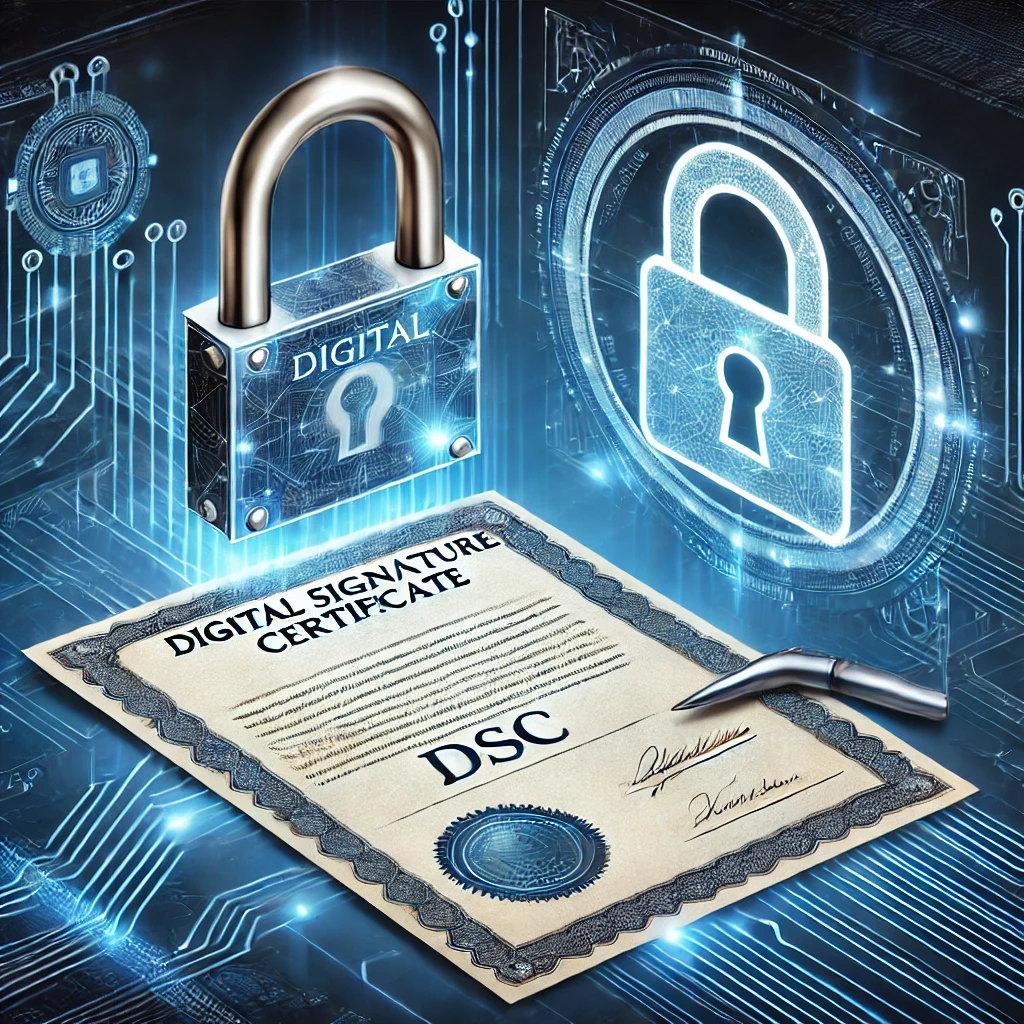Start Business
Start Business
Registration & License
Registration & License
Trademark Filing
Trademark Filing
Goods & Service Tax
Goods & Service Tax
Income Tax
Income Tax
MCA Services
Tender Registration
Tender Registration
Others
Digital Signature / DSC Provider in Delhi NCR | Get DSC Online Fast
Best & Reasonable Plans
Smart solutions,fair prices - your success starts with the Innovative solutions, competitive pricing – your journey to success begins with the perfect balance for growth!

OVERVIEW
The digital signature page on your website will provide users with a secure and efficient way to sign documents electronically. This feature is designed to streamline the signing process, eliminate the need for physical paperwork, and ensure the authenticity and integrity of signed documents. Whether for contracts, agreements, or legal forms, the digital signature page will offer a user-friendly interface, robust security measures, and compliance with legal standards.
- • Easy-to-Use Signature Interface :Users can sign documents using a drawing pad, type their signature, or upload a pre-saved signature.
- • Secure and Encrypted Signatures :All signatures are encrypted during transmission and storage to prevent tampering or unauthorized access.
- • Legal Compliance and Authenticity :The digital signature process adheres to global standards like eIDAS (EU) and ESIGN Act (US).
What Is A Digital Signature?
A digital signature is an electronic form of a signature that is used to authenticate the identity of the signer and ensure the integrity of the document. Unlike a simple scanned image of a handwritten signature, a digital signature uses cryptographic algorithms to create a unique "fingerprint" for the document. This fingerprint ensures that the document has not been altered after it was signed and verifies the signer's identity.
Security and Integrity :
Digital signatures provide a robust layer of security and ensure the integrity of documents through advanced cryptographic techniques. When a document is signed digitally, a unique "hash" (a string of characters) is generated using algorithms like RSA or ECDSA. This hash acts like a fingerprint for the document, ensuring that even the slightest alteration to the content will change the hash entirely, making tampering immediately detectable. Additionally, digital signatures authenticate the identity of the signer by linking the signature to their digital certificate, which is issued by a trusted Certifying Authority (CA). This ensures that the signature is not only secure but also verifiable, protecting against forgery and unauthorized access.
Legal Validity :
Digital signatures are legally recognized and hold the same weight as handwritten signatures in most countries, thanks to compliance with global standards like the eIDAS Regulation in the European Union and the ESIGN Act in the United States. In India, digital signatures are governed by the Information Technology Act, 2000, which grants them legal validity for electronic records and transactions. This makes them essential for signing contracts, filing taxes, submitting government forms, and other legal processes. The use of digital certificates issued by licensed Certifying Authorities further enhances their credibility, ensuring that signed documents are admissible in court and legally enforceable.
Convenience and Efficiency :
Digital signatures streamline workflows by eliminating the need for physical paperwork, printing, scanning, or mailing documents. They enable users to sign documents from anywhere, at any time, using a computer or mobile device, making them ideal for remote work and global collaborations. This not only saves time but also reduces costs associated with paper, ink, and postage. Moreover, digital signatures integrate seamlessly with various software and platforms, allowing for quick and efficient processing of agreements, approvals, and filings. This convenience, combined with enhanced security and legal validity, makes digital signatures a powerful tool for businesses, governments, and individuals alike.
Silent Features
Tamper-Evident Technology
Seamless Integration
Multi-Platform Accessibility
Automated Audit Trails
Environmentally Friendly
Global Recognition
Advantages of Digital Signature Certificate
- Faster Turnaround Times : Digital signatures eliminate delays caused by printing, mailing, or scanning documents, enabling instant signing and faster decision-making.
- Cost Savings : Reduces expenses related to paper, ink, postage, and physical storage, making it a cost-effective solution for businesses.
- Enhanced Customer Experience : Allows clients or partners to sign documents remotely, improving convenience and satisfaction.
- Improved Document Security : Encrypts signed documents, ensuring they are protected from unauthorized access or data breaches.
- Simplified Compliance : Automatically meets regulatory requirements for industries like finance, healthcare, and legal, reducing the risk of non-compliance.
- Scalability :Easily handles large volumes of documents, making it ideal for businesses of all sizes, from startups to enterprises.
Documents Required
Certificate of Incorporation / Business
GST Registration Certificate
PAN Card of the Business Entity
Address Proof of the Business
Employee Details with Salary Structure
Canceled Cheque or Bank Statement
Step-by-Step Guide for getting Digital Signature Certificate
Here are 5 steps to complete your GST registration process
Step 1
Choose DSC Type
Step 2
Submit Application
Step 3
Verify Documents
Step 4
Complete Payment
Step 5
Receive DSC
Empowering Your Business to Stay Ahead


Ensuring excellence in every aspect of business operations

Helping businesses to stay ahead of the competition effectively

Providing expert guidance for long-term business growth





